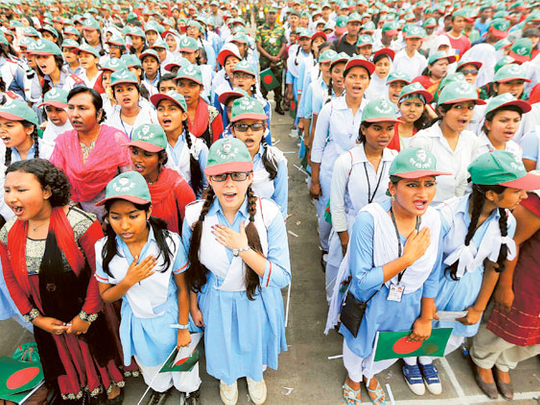
Dhaka: More than 250,000 Bangladeshis sang in chorus the national anthem to set a new world record coinciding with the 43rd Independence Day celebrations.
Prime Minister Sheikh Hasina joined the chorus along with the 1971 Liberation War veterans and her cabinet colleagues at the event aimed at getting Bangladesh’s name recorded in the Guinness Book of World Records.
Cross sections of people including school children sang simultaneously the “Amar Sonar Bangla, ami tomai bhalabashi” (My Golden Bengal, I love you) at the “open to everyone” event monitored by Guinness Book officials at the National Parade Ground.
According to machine counts 2,54,681 people sang the national anthem simultaneously at the main ground but organisers said the figure exceeded 3 lakh with inclusion of audience who joined the chorus on the sidelines.
Nobel Laureate poet Rabindranath Tagore, also the composer of the Indian national anthem, composed the song in 1905 against the partition of Bengal by the then British rulers.
It was first sung as the country’s national anthem when Bangladesh’s Liberation War time acting government was installed on April 17, 1971.
The Guinness Book officials said they would come up with a formal announcement on the record accomplishing the due formalities and scrutiny of the event staged by the cultural affairs ministry with supports of armed forces.
India held the past record in the category on May 6 last year when 121,653 people sang simultaneously the Jana Gana Mana odhinayoko joyo he Bharotobhagyôbidhata” in an event staged by Sahara India Pariwar (India) in Lucknow.
Bangladesh previously formed the world’s largest human national flag as it celebrated the 42nd Victory Day on December 16, 2013 marking the surrender of Pakistani troops to Indo-Bangla joint command in Dhaka after nine months of war.
An estimated three million Bengalis died during the Liberation War led by the interim Bangladesh government in exile with its headquarters in Kolkata in West Bengal.
India also sheltered nearly 10 million Bangladeshis who fled the country to evade atrocities by Pakistani troops, their Bengali speaking collaborators.
As part of the Independence Day celebrations, tens of thousands of Bangladeshis thronged the National Memorial at suburban Savar and offered wreaths to the martyrs of 1971, when officially three million people were killed.
President Abdul Hamid and the premier placed the wreaths first in a solemn ceremony when the army bugles played the last post.
In a related development, Bangladesh yesterday moved the court seeking to ban largest Islamist party Jamaat-e-Islami for its institutional engagement in crimes against humanity during 1971 Liberation War while most of its top leaders were exposed to justice on war crimes charges.
Jamaat was opposed to Bangladesh’s 1971 independence while its top leaders were prosecuted on charges like genocides, arsons and rapes siding with the Pakistani troops in two special tribunals as the country initiated the war crimes trial four years ago.
Until now the two special tribunals delivered verdicts in nine cases, handing down capital punishment to six people, five being Jamaat leaders while one of them, Abdul Quader Mollah, was executed ahead of the 43rd Victory day celebrations in December last year.
The rest of the cases were still under trial or pending for review in the apex Supreme Court.












